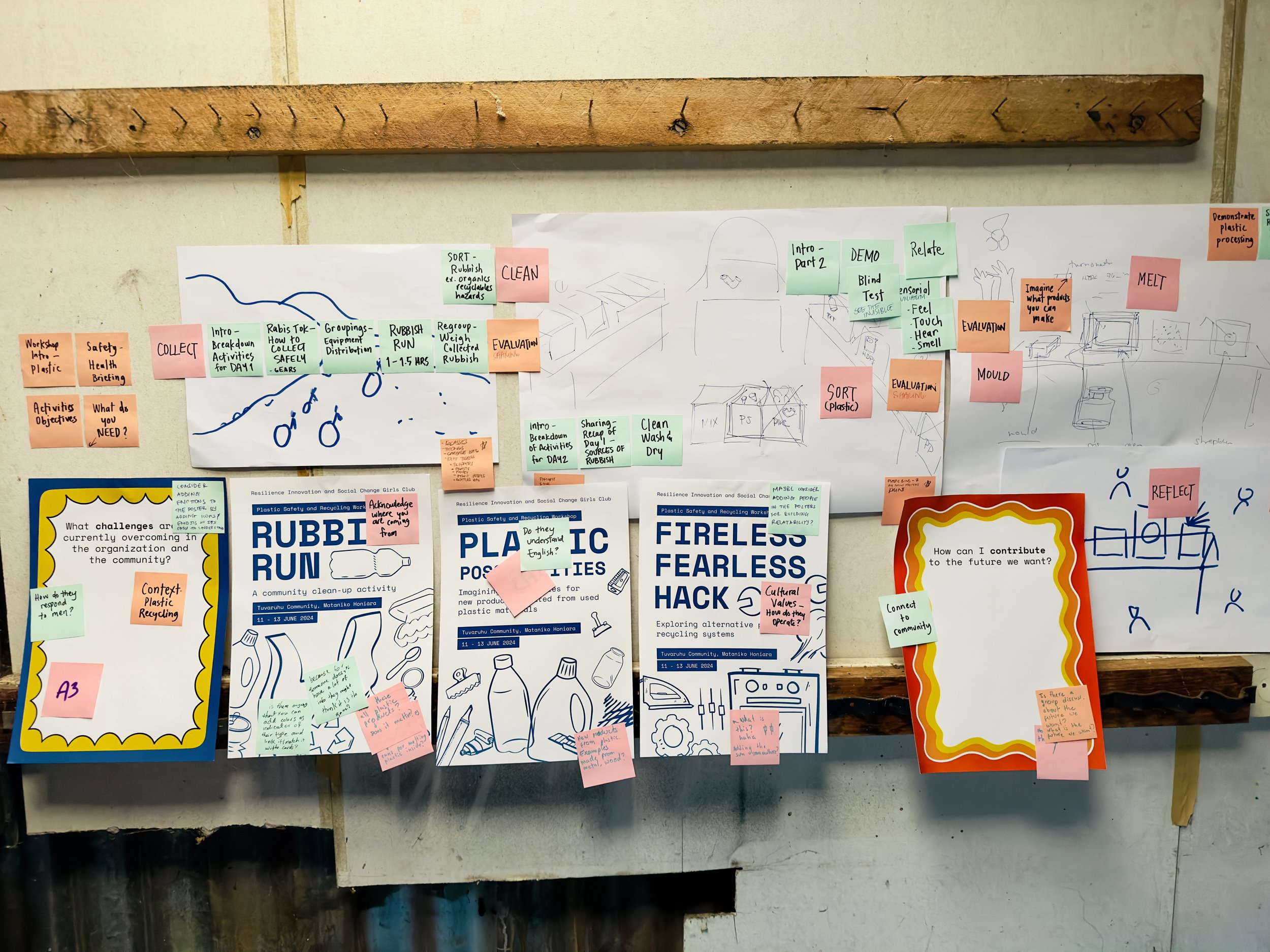RMIT University - Major Project • SOL
How can we support the Tuvaruhu Community’s transition to a circular economy through community-based resources for recycling plastic waste that create business opportunities?
SOL is a Design for Social Innovation project that aims to support the Resilience Innovation and Social Change Girls Club (RISC-GC), a community-led youth group in peri-urban Honiara, Solomon Islands, to continue to recycle plastic waste in a safer and healthier way. The project proposes a workshop that delivers plastic safety and recycling literacy to spark creativity and create business opportunities for the RISC-GC and the Tuvarahu community.
A project proposal that delivers plastic literacy and promotes health and safety alternatives when recycling plastic waste through a workshop with RISC-GC in Tuvaruhu, Mataniko.
A series of activities and a probe kit that prompts the basics of plastic, focusing on health and safety when collecting, sorting and processing plastic waste.
Evaluated the design outputs with three criteria [1] design of communication strategy [2] technical details of workshop objectives, structure and activities and [3] benchmark similar projects, processes and outcomes.
Outcomes
Approach
Design for Social Innovation • Community-based Participatory Design • Circular Economy Principles
Methodology
Empirical investigations • System thinking and mapping tools • Paper and rapid prototyping • Generative AI - spatial interpretation • Communication design and strategy • Testing
The Resilience Innovation and Social Change Girls Club (RISC-GC), a community-led youth group in peri-urban Honiara, has initiated a project to recycle discarded PET bottles into pavement bricks. However, this endeavour has facilitated their transition towards a circular economy. Still, they necessitate additional knowledge, tools, and resources to improve plastic waste collection, sorting, and processing in a safer and more sustainable manner.
Collected discarded PET bottles into payment bricks
Community-based participatory design
In 14 weeks, I participated in a community beach cleanup to observe how communities coordinate such activities. I also conducted an in-depth examination of the production process, different varieties, characteristics, and production techniques. I consulted with a chemistry expert to validate my findings and understanding of polymers and plastics. And for me to design and develop hands-on activities, I went to a maker space and interacted with an artist specializing in recycled plastic.
Limitations of the study:
Lack of resources for the Solomon Pidgin language: Solomon Island Pidgin is unavailable on Google Translate, and unavailable translators
Lack of access to RISC-GC: Due to ethical, time, and geographical constraints, the visual language used in the design artefacts cannot be verified and may be influenced by cultural bias and mistranslation.





Evaluation of design artefacts
Given the limitations of this study, I acknowledge that the project proposal is designed for the community and could be developed in collaboration with them in the next stages of this project. I’ve evaluated the design outputs with three criteria.
Design of communication strategy: Evaluate the written instructions, details of information and physical attributes of the materials
Technical details of workshop objectives, structure and activities: Evaluate the viability and feasibility of the proposed workshop structure and activities from a humanitarian perspective
Benchmarking of similar projects, processes and outcomes: Evaluate the desirability of the project with similar projects in terms of processes and outcomes
Socio-economic and ecological resilience
The Plastic Safety and Recycling Workshop promotes socio-economic and ecological resilience in communities like Tuvaruhu. By prioritizing understanding health and safety measures related to plastics, the RISC-GC can expand its local initiatives to advocate for improved waste management policies and education within its community. This can also foster collaborations and partnerships with other communities to achieve sustainable plastic management practices. Developing recycling processes that are suitable for them can advance their business operations, creating more jobs in waste management. Adopting this sustainable practice also benefits surrounding environments by restoring biodiversity and improving ecological outcomes.
Plastic Safety And Recycling Workshop value proposition and activities storyboard
For more information about this project,











